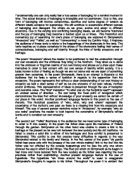Fundamentally one can only really feel a true sense of belonging for a nominal moment in time. The actual instance of belonging is intangible and not permanent. Due to this, any form of belonging will involve compromise, sacrifice and some degree of tension as different ideals compete for supremacy. We will continue to accumulate different senses of belonging and disregard the others as we grow, evolve and adapt to different situations. Due to the varying and conflicting belonging ideals, we will become frustrated and the joy of belonging may become a burden upon us at times. This frustration and momentary joy of searching for one’s place of belonging are explored in Skrzynekci’s “Ancestors” and “Feliks”, as well as “Homecoming” a novel by Cynthia Voigt. It implores the audience of these texts to relate to the happenings of the characters in the texts. The texts requires us to place ourselves in the shoes of the characters feeling their sense of connectedness, belonging and self identity through the links of family ancestors and or heritage.
The poem “Ancestors” allows the reader to be positioned to feel the connection through our own ancestors and the attributes they bring to the forefront. They allow us to delve into the unknown or forgotten realms of our own history and allows us to draw upon these memories in order to feel content with our own sense of identity within society. It is a basic human notion of feeling as though we are not alone and we are apart of something greater then ourselves. In the poem Shrzynecki, there is an attempt to illustrate to the audience that he feels a sense of isolation in regards to the separation from his ancestors. The poem represents that without a clear understanding of our own history or ancestry we lack a clear sense of self as we are unaware of our past values, motives and/or attributes. This representation of ideas is presented through the use of metaphor and narrative voice. The “Star” metaphor “To what star do the footprints lead?” represent an unclear sense of direction – the star being the focal point of navigation which demonstrates the idea that without knowledge of your ancestry we cannot be certain of our place in this world. Another prominent language feature in this poem is the use of rhetoric. The rhetorical questions of “who, what, why and where” represent the uncertainty of the Author’s own past as there is a missing link from his ancestors and himself. The use of second person narrative voice in “Ancestors”, for example “why do you wake” positions the reader to look beyond the constraints of Skrzynekci’s written words and to consider our own ancestry.







